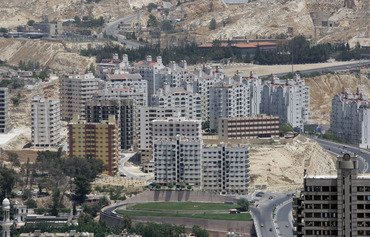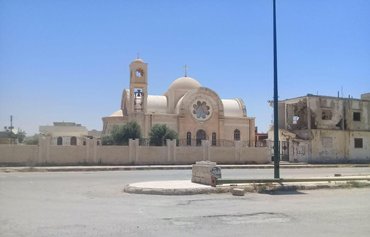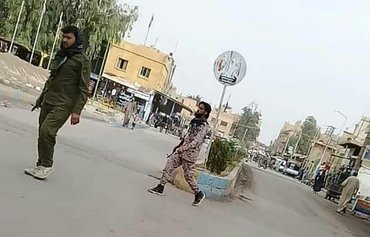Fearing Syria's regime would expropriate abandoned properties or tamper with deeds, a network of activists and lawyers has been working for nearly five years to preserve property deeds and other civil paperwork.
In opposition areas, the Free Syrian Lawyers (FSL) enter town registries and photograph, log and organise the documents, said Ghazwan Koronful, a Syrian lawyer who heads FSL from Turkey, where he has lived in exile since 2012.
So far, they have rescued "about 1.7 million documents", including up to 450,000 land-related documents from northern and central Syria, he said.
These include title deeds, contracts and other papers that displaced Syrians could use to prove property ownership.
![A Syrian woman carries a child after arriving with a convoy of displaced people into regime-controlled territory at Abu al-Zuhur checkpoint in Idlib province on June 1st. [George Ourfalian/AFP]](/cnmi_di/images/2018/06/21/13213-Syrian-woman-child-600_384.jpg)
A Syrian woman carries a child after arriving with a convoy of displaced people into regime-controlled territory at Abu al-Zuhur checkpoint in Idlib province on June 1st. [George Ourfalian/AFP]
These documents are crucial now, Koronful said, as the regime passes laws that rights defenders fear may unfairly dispossess Syrians from their homes.
"Our work simultaneously protects against hostilities that could damage the deeds, and against the regime's attempts through these new laws to tamper with people's properties," he said. "Those files represent the hope of return."
Digital copies
FSL sprang into action after Homs city's registry was destroyed in a fire in 2013.
Smuggling out original deeds from other towns was risky and could be considered tampering, so the FSL's 15 lawyers opted for digital copies.
With help from civil society group The Day After, they travelled to Turkey to learn how to handle, photograph and archive documents.
Back in Syria, they began working through abandoned registries in northern opposition towns: Harem, Azaz, Saraqeb.
Here they photographed thousands of deeds, making sure names and dates were clearly visible, said an FSL lawyer in Syria who identified himself as Samer.
Each month, they sent external drives to Koronful in Turkey, worrying that registries would be bombed before they could finish.
Sometimes they lost the race. In 2013, days before FSL was to begin photographing deeds in the northern town of al-Bab, the "Islamic State of Iraq and Syria" (ISIS) swept in and destroyed the registry, Koronful said.
They now struggle to get permission to enter registries, especially in extremist-run Idlib, occasionally photographing in secret.
A chance to return
Since Syria's war erupted in 2011, more than six million people have been internally displaced and another five million have fled the country.
A vast majority leave behind property-related papers, the Norwegian Refugee Council found in polls last year.
That puts them at risk of losing access to their land through laws such as Decree 10, which allows for property expropriation for urban development.
A set of laws allows for missing titles to be restituted using digital copies, but it remains unclear if the regime would accept a version produced by opposition-affiliated lawyers.
"We are expecting a lot of people to ask for copies," said The Day After's Amr Shannan.
For now, the digital titles remain tucked away on a pair of hard drives, one in Turkey and another in an undisclosed European city. They are not yet searchable, but are archived in the same order as the originals.
"If there is going to be a return of refugees, one of the most important factors is that they have homes or land to return to," Shannan said.

![Syrians displaced from the Aleppo province city of Afrin display pictures of their homes while gathering in a house in the al-Hasakeh province town of al-Malikiyah on June 5th. [Delil Souleiman/AFP]](/cnmi_di/images/2018/06/21/13210-Displaced-Syrians-photos-600_384.jpg)






